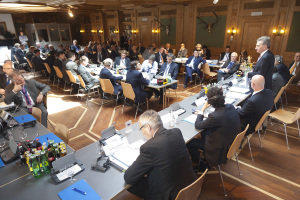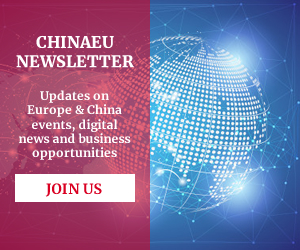While Europe bets on energy and digital for growth, it should keep a close eye on China
Lech, 17 April 2015 Innovation. Competitiveness. Growth. Digitalization. These were recurrent words during the two-day forum held in the Austrian village of Lech. There, over 80 representatives from the European energy and digital industries, the European Commission and academic circles met under the leadership of Günther Oettinger, Commissioner for digital economy, who previously served as Commissioner for energy.
The underlying theme was “Energy meets digital”. The bottom line was that well-planned investments in the digital transformation of Europe’s industrial fabric can improve structural growth conditions in the region. Bringing information and energy technologies together in integrated responses to societal challenges, as is done for example in smart cities, can help reduce costs for European businesses –also the energy-intensive ones– and create new business opportunities for innovative European companies to go global.
But a general frustration pervaded every single panel discussion. Why Europe doesn’t have a Silicon Valley? Why Europe is not able to produce a Google, an Apple, a Facebook, an Alibaba, a Baidu or a Xiaomi? How come that all these companies have double to three times the stock market levels as those of the major European champions? While we are discussing about the most efficient way to spur growth and revitalize record-low investment levels, China is printing cars, developing world leading drone technologies, promoting over 600 smart city projects nationwide, and investing EUR 6bn in high-tech startups. Where is Europe standing in the meantime?
The awareness is that Europe needs a clear vision. A pan-European strategy is crucial if the continent wants to restore competitiveness in the driving sectors of the future and catch up with the US and with China. Europe needs to be ready for radical changes. The continent is too slow, the bureaucratic system is too heavy to allow for the necessary nimbleness to support a dynamic industry. Europe is also one of the world’s most regulated regions in the world. This has to change.
Events like this in Lech should happen more frequently. It is reassuring to know that the new Commission is aware of the underlying obstacles to economic growth in Europe and has open ears to listen to constructive proposals from the European economic actors, who ultimately bear the responsibility to deliver jobs and growth. Without doubt, this was the most comforting message of the two-day discussions: Europe has a strong and ambitious Commissioner who is ready to do what necessary to restore growth. This includes serious commitment to build a harmonized set of rules for the digital market, wiliness to create a less regulated business environment, support to industry consolidation and scale building, confidence building toward the new Juncker investment plan of EUR 315bn.
If Europe wants to be leader in the key technologies of the future, a key precondition is that it directs efforts into a clear goal and speaks with a common voice to the rest of the world. If this process takes too long, countries like China will develop their own technologies and set global standards alone, leveraging scale and R&D resources that Europe can only envy. For this reason, ChinaEU calls for immediate action to consolidate Europe’s relation with China, in an effort to create synergies among the two economies on the development of strategic areas like 5G, smart cities, smart energy, internet of things, big data and clean mobility.



